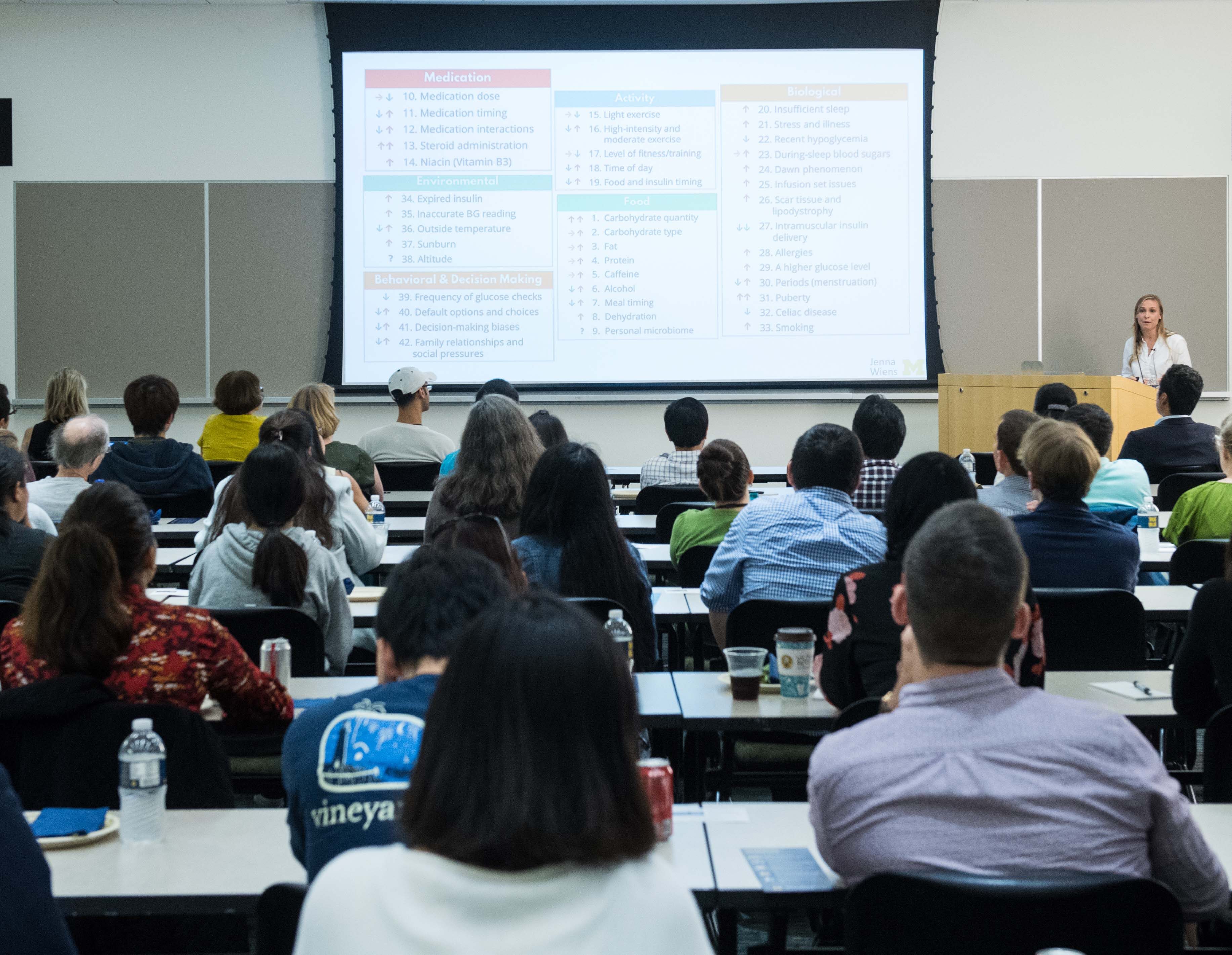Precision Health at U-M announces first-of-its-kind graduate certificate program

University of Michigan (U-M) graduate and professional students now have the opportunity to develop knowledge and skills specific to the emerging field of precision health. The new Precision Health Graduate Certificate Program, the first program at U-M to focus on the competencies of precision health, is accepting applications for the fall 2019 semester. Developed by U-M Precision Health’s Education & Training Workgroup, the certificate will be administered by the U-M Medical School’s Department of Learning Health Sciences (DLHS).
“The Precision Health Graduate Certificate Program is an excellent opportunity to develop the next generation of researchers who will shape increasingly personalized and customized health care delivery,” said Marschall S. Runge, MD, PhD, executive vice president for medical affairs and dean of the U-M Medical School. “The resources and expertise that exist at the University of Michigan make us uniquely qualified to bring together the many disciplines that play a role in precision health.”
As the science and practice of precision health grows and evolves, the need for a workforce experienced in the diversity of this field is critical. This certificate program will ensure researchers and health professionals are equipped with the skills and training to contribute to this emerging field. Students in fields related to precision health—such as medicine, engineering, nursing, pharmacy, public health, genetics, and others—will gain knowledge of precision health’s key competencies:
- Ethical, Legal, and Social Implications of Precision Health
- Data Science & Predictive Health Analytics
- Biosocial Determinants of Health/Policy/Economics
- Human Genetics in Health & Disease/Molecular Medicine
- Bioinformatics/Computational Genomics
- Consumer Health Informatics and Healthcare Systems Engineering for Precision Health
The program curriculum introduces students from these multidisciplinary fields to new concepts that are beyond their current field of study, but directly related to precision health, and serves to stimulate innovative thinking among faculty and students.
“Students who pursue a certificate in Precision Health will be on the cutting edge of a rapidly developing field. They will be placed at the forefront of promoting better health and ensuring that the right treatment is given to the right patient at the right time,” said Gretchen A. Piatt, MPH, PhD, Associate Professor and Associate Chair for Educational Programs in DLHS, who will serve as a chair of the certificate program.
As new courses with a precision health focus are developed, they will be incorporated into the certificate program to reflect the rapid pace of development of the field. “Although some US universities offer programs in the more narrowly focused field of ‘precision medicine,’ no certificate programs with the same breadth and depth of focus have been identified at other academic institutions,” said Vicki L. Ellingrod, PharmD, FCCP, co-lead of the Precision Health Education & Training Workgroup.
The Precision Health Graduate Certificate will be open to PhD, MS, MA, M Engineering, and master’s- or doctoral-level health professional students. Many courses in the program may require some prerequisite classes or knowledge and skills. The certificate will require a minimum of 12 graduate credit hours of coursework and can be completed in two to four semesters. Applications are due August 1 for fall term and December 1 for winter term. Program details are housed on the DLHS website.
About Precision Health
A presidential initiative announced in October 2017 and jointly founded by the Office of the Provost, Michigan Medicine, the College of Engineering, the College of Pharmacy, and the School of Public Health, Precision Health at U-M brings the best and brightest together to develop social, medical, computational, and engineering discoveries; translate these discoveries into treatments implemented in partnership with Michigan Medicine and regional health systems; and evaluate and increase the public health impact of effective therapies.
About the Department of Learning Health Sciences
The University of Michigan Medical School Department of Learning Health Sciences (DLHS) is a first-in-the-nation basic science department focused on the sciences related to learning across multiple levels of scale (i.e., individual, group, organization, region, nation). DLHS works to improve health in systemic ways by advancing the sciences that make learning effective, routine, and efficient. In addition to the Precision Health Graduate Certificate, DLHS offers two graduate degree programs, the Health Infrastructures and Learning Systems (HILS) PhD and MS and the Master of Health Professions Education (MHPE).


